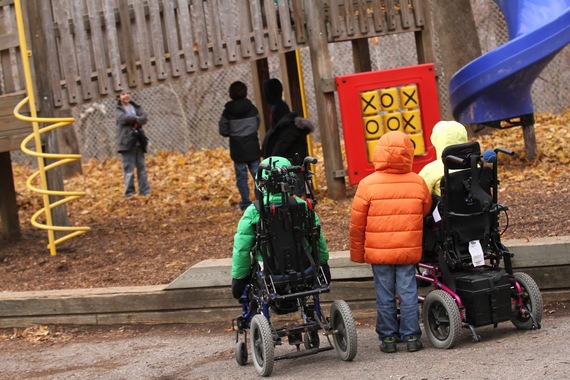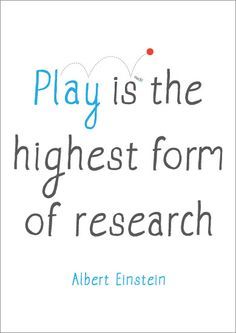A few days ago, when the weather was abnormally nice for this time of year, my pca and I took a roll in a local park. Seeing the playground made me reflect on my memory of playing on the playground. Unlike many kids who have numerous experiences on playgrounds, I only have one faint memory. I was so young that I can't even be sure that it really even happened. Regardless, what I remember is somehow being left alone at the top of slide in my preschool. I slid down the slide on my hands and knees, which really scared me. I remember crying and then being found by a staff member. That is the only memory I have of ever being on the playground. I couldn't visit most playgrounds because they weren't designed for kids who use wheelchairs. Twenty years later and I still can't visit the majority of them for the same reason, despite the laws like the ADA.
There has been some improvement. I found one great resource called Let Kids Play, which is a directory of accessible playgrounds in the each of the United States and Canada, as well as internationally. Ironically, the only accessible playground in a 75 mile radius, is the one I was left on over 20 years ago. We need to do better.
That's not to say that I didn't have play. My family did a great job and continues to do a great job of creating fun activities that include me. My cousin, Jay, loved to play "Ninja Turtles," when we were little. This consisted of him pretending to be the bad guy and him making me pretend to kick him. Then he would pretend to fall. Mixed Cerebral Palsy causes my muscles to be very tight in some areas and overly loose in others. My first physical therapist always knew when I had been playing a lot of "Ninja Turtles," because my muscles would be so much looser afterwards. She thought that was great.
That same cousin would drag me around in a laundry basket up and down the hall. One of our favorite games was to put all the pillows on the floor and then roll me off the bed onto them. My grandma didn't like that very much. It was so much fun. At that time, it was a lot easier for me to fall because my muscles weren't as tight as they are today, so I could fall without getting hurt. I was more like a typical kid and fell a lot.
I got into a lot of trouble with my cousin, Jay. One day, we set up some plastic fencing and pvc pipe at the end my grandparent's somewhat steep driveway, and Jay rolled me to the top of the driveway and then let me go, so I built up some speed. Our idea was that the fencing would keep my chair from rolling into the road. It did work and it was great fun, as long I went straight. The last time we tried this, I went crooked and tipped my chair over, which resulted in me getting two black eyes and breaking off my two front teeth. Most people don't know that my two front teeth are more than half fake now. In our defense, my grandma helped us set up the fence. It worked well, until I went all crooked and face planted on the driveway instead of the soft grass. Needless to say, that ended that. My only lasting consequence is that I can't eat corn on the cob. I went to Disney a few days later and have photographic evidence of my epic adventure. (It was worth it.)
Other family members got into the action, too. My family has a tradition of going on a walk after Thanksgiving dinner. For a few years, it was fun for me and my cousins. They wore their roller skates, and I towed them around the neighborhood.
I think all of these play experiences are reasons that I turned out pretty typical. Some families probably don't take the same approach. Sometimes, people with disabilities are more fragile, but that doesn't mean that they can't play and that every person with a disability is necessarily fragile in all situations.
Parents can be over protective and they don't realize that they are depriving their children from crucial developmental experiences. I bet there are even ways for people with severe disabilities to partake in play.
Stuart Brown, author of "Play" and founder of the National Institute of Play, has done extensive research. He argues that play must be important because all of nature has some form of play in their young. It's a way to build crucial skills and in humans it helps develop critical thinking, problem solving, and maintaining brain activity as we age.
It saddens me that there are still so few accessible playgrounds, where kids with disabilities can do a lot of their playing. Kid's with disabilities often get left out of physical education activities and even classroom play, rather than having it adapted to include them. I would have been left out of the first year bonding experiences in colleges, if it hadn't been for my very assertive pca. Play is vital.
There are many adaptive sports organizations like Adaptive Sports and Adventures Program, Triad Trackers, and Bridge II Sports. There are documentaries like Murderball. Books are being written that examine the intersections of sports and disabilities. Progress is being made. The idea that people with disabilities can play is more widely accepted in some circles.
I encourage you to check out your local playgrounds. Are they accessible? If not, work with your community to make them accessible. Encourage all parents to let their kids play. Create opportunities for inclusive play experiences like my family did and still does.
That's how I roll....and play.

